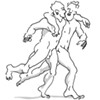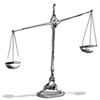[image-1]
If you dare to watch the news, you may get the idea that civilization is unraveling, or at best, that the political situation of the United States is so mired in its own insanity that it's never going to get out of the swamp.
We are watching, silently for the most part, while every major problem that affects the world is being ignored. We are watching while war and epidemics spiral out of control—and yet while everything else is being made into an issue.
All aspects of life—success, failure, education or the lack of it, poverty, wealth, gender, economics, one's skin color, the food we eat, one's internal organs (especially if female), the heat that prevents you from freezing in the winter, all communications from the most private to the most public, the meekest personal choice and even the subtlest emotion— are all subject to being politicized.
That is a weird word, and a stranger concept. In our time of history, when it seems the destiny of humanity and every other species is being gambled, we are all standing at the intersection of the personal and the political. Every last thing we desire, need, think, or do can be turned into a political commodity, processed by spin doctors, spliced into a 30-second ad, and force-fed back to us with an emotional charge designed to manipulate—that is, politicized.
Our political systems, that is, the structures that supposedly run society, are nakedly answerable to nothing but the power of money. We all watch as the opinions and the wellbeing of ordinary people are ignored. We are told there are issues, but nearly all the time, ideology is merely packaging designed to motivate political contributions. Congressional representatives, who must seek reelection every two years, spend their entire terms fundraising for the next election.
When I look at many politicians, I see a strange sickness emanating from them. It is imprinted on their faces, in their body language, in their voices, and in what passes for reason. The parade looks like a pageant for who should get their photo in the dictionary next to the term "narcissistic wounding." I look at many of them and wonder how anyone, anyone at all, could take them seriously; could trust them with anything, much less the fate of society.
Politics is deceptive, and for at least as long as we know, it always has been. Of the people I know who are involved in politics, I expect most of them to lie to me. I have for many years had friends in politics, and as time has gone on, I have noticed that fewer and fewer of them reveal any capacity for truth—by which I mean their words and their actions being in alignment. It's not enough to be personable or charming to seem real. The bottom line is that metric between words and actions.
When I was in my 20s, I got out of political campaign writing, something I was passionate about, because I figured out that in order to do that particular job, I would need to lie to the public on a routine basis. I have done so personally. I have said things to public bodies, been quoted in newspapers, and made written statements that were untrue based on my understanding that it's simply how the game is played.
For example, in politics one never reveals a candidate's true position if it's going to cost the candidate votes. One never gives their opponent an edge like that. If there is a campaign spending limit, and the limit prevented a real campaign, I would break the rules and do it in as untraceable a way as I could, and make sure the supporting documents looked good.
I was always sure to lie for the "right" cause and on behalf of the "right" people, people I sincerely supported and had personally vetted, though it was deception nonetheless. Not wanting to play that game— indeed, being disgusted by that game— I got out, and pursued being an investigative reporter, where verifiable truth is the only commodity.
Deception is the very feedstock of politics, as the game is currently played, and as it's been played for a long time. One must actually do it personally to understand this fact in a meaningful way, and even then, few will ever admit it. Once you've been involved, then it's possible to look at any person in a position of power making a statement and know that the statement is either an outright lie or conceals some deeper truth.


























